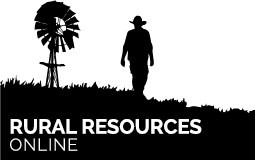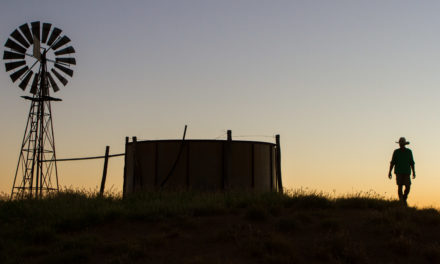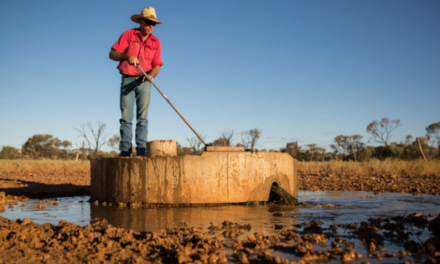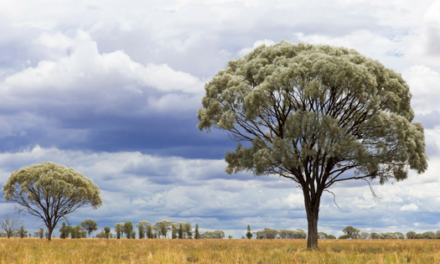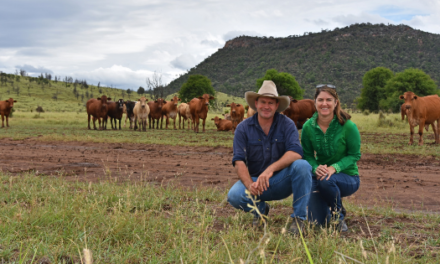The importance of collaborative relationships and open communication between all stakeholders involved in Australian agriculture was evident at the 2019 Australian Farm Institute conference. Scientists, industry representatives, agribusiness specialists, lawyers, large scale enterprises and smaller family farming businesses were represented.
The theme, ‘Farming in a risky climate’ set the framework for discussing the accelerating pace of risk exposure due to changing environmental conditions.
The farmer’s perspective on climate change
The opportunity to advocate on behalf of primary producers is not one I take on lightly. As a grass roots producer with family and friends in the Industry, I am directly impacted by policies and perceptions about agriculture. As a grazier I know the challenges facing crop farmers can be different. But overall, we share common ground.
I was impressed to see so many producers asked to participate in panel discussions. Every session involved input from farmers. Minister Littleproud spoke about the need for common sense to be shown and he acknowledged the need to review some current policies. The audience was told how important it is to have faith and confidence in Australian farmers. In turn, they need to have the support at the farmgate. ‘Stewardship translates into profit and loss’.
Personally, I think the term climate change, in terms of engagement with agriculture, is similar to mentioning succession planning.
Both are usually followed with ‘what are you doing about it?’.
In defining climate change humans are blamed for their direct or indirect involvement. This has translated into a believer verses non-believer debate that, compounded by politics, results in specific groups being targeted.
The importance of a collaborative discussion about climate change
Without open dialogue one person’s assessment will continue to be judged by another’s perception of the situation.
Producers are defensive because from their perspective it is easy to blame the 2% of the population feeding the other 98% as being the problem. Many who do blame choose on a hot day drop the temperature by turning on their airconditioner with little consideration given to their personal carbon footprint.
Those in the other 98% of the population have mixed positions as well.
Whatever the position an individual may possess, others will talk with or without them involved.
One thing I do know…
people want to hear from farmers directly. Not just ‘about’ them indirectly.
The pressure from many external sources telling agriculture what and how they should be doing the job is increasing. Operating a primary production business is complex. Farmers feel targeted by the Govt Departments they once worked with collaboratively and they are therefore hesitant to share and open their business to scrutiny for feel of retribution. They continue to work proactively to ensure their systems are adaptive. It is however, a shame the great work being done by so many will be hindered until trust levels improve.
Talking about climate variability in terms of the words ‘climate change’ is a necessary strategic response for the Industry. For this reason the NFF Carbon Neutral policy and initiatives such as the Australian Beef Sustainability Framework are important. Customers and concerned citizens throughout the world have a deep concern for the future of the planet and they expect action.
Large corporations such as McDonalds want commitments and proof this is happening.
Interestingly, Hugh Killen from AACo acknowledged their corporate response to develop a sustainability policy was, in part, due to the governance awareness that climate change is considered a known risk that must be addressed.
We are not all corporate agriculturalists. But we are all impacted by the discussions about climate change.
Farmers are part of the climate change solution
The opportunity to comment on the presentation by the CSIRO, SARDI and ABARES allowed me to say:
- how important it is to not only show common sense but also find a common language. We speak Producer not PHD. If you ask how we are noticing our seasons are changing we will talk about our Summer break coming at the end of February now instead of the end of December and how we have adjusted our feed budgeting accordingly etc
- it’s all in the approach. As a major land user, the agricultural industry has an impact on the environment and is particularly exposed to environmental risks such as climate variability. Without a healthy natural environment, including soil, water, air and a thriving natural ecosystem, the industry is unable to prosper. To get more farmers on board talking openly about climate change they have to be welcomed into the discussions (as part of the solution – not the problem)
- how the changing role of extension officers is reflected in current policy creation. Historically, the on ground staff played a vital role in connecting Industry and Government. They identified issues and fed this information up the reporting channels to assist policy makers respond accordingly. The bottom up approach has been replaced with a political decision now coming from the top that must be implemented Departmentally
- there is currently no accountability or consequence for those directing the processes imposed on Agriculture. All impact is left for the farmer to manage and live with
- Environmental policy must begin at the farmgate. The farmers own the land and soil, but many have mortgages to repay. Environmentalists are very good at being loud and blame driven – not a great way to foster a collaborative and trusting relationship
- we are responding to this risk, but it is one of many we do manage in our complex operating environment. For example the predicted hotter Summers mean increased fuel load and the likelihood of more intense fires. This creates a challenge for properties neighbouring National Parks and for landholders following current vegetation management laws where legal fire break widths pose a WH&S risk.
Conversations are about context. A second day session discussed ‘how will climate change alter our biosecurity exposure?’ As a landowner it was good to be able to say changing environmental conditions are only one biosecurity threat. Increased third party activity like csg and potential farm invasion threats by activists add to our risk profile.
The many perspectives on climate change
My notebook is filled with many interesting bit of information. These insights include:
- Carbon farming is a blunt instrument with many unintended consequences
- The problem with a focus on productivity is that is the shortening of our natural capital
- Ag is an important community service – if the farmer didn’t do it, who would?
- Agriculture is a business based on a societal imperative
- Ag is significant for the economy and rural communities
- Consumer trends are shifting. There is shift away from certification to the stories behind the food
- 2/3 of the non-frozen world is in the hands of farmers. Everyday another 228,000 are born
- 40% of the food produced is wasted, much of this is at the farm gate
- WWF employ over 4000 people in their Climate area
- Trust is not just a focus of local consumers. Trust and climate change are global issues
- In the future areas of Australia won’t be able to carry the same level of debt as previously
- Lending institutions want proof of resilience through the numbers ie 5 yr history and 3 yr forecast. The preference is for a 10 and 20 year plan with a clear vision for the business
- Long-term debt products (5yr, 10 yr money) now have less clarity due to seasonal changes. This is because they are causing more uncertainty around cashflow
- The perception that Ag is an old man’s game is changing. More younger family member are coming back into the business. There is a range of tertiary educated millenials bringing their skills and they are tech savvy creating on-farm opportunities
- Although the broader millenial community hasn’t engage in Ag, Agtech provides a window and this is very positive for the sector
- Below the soil lies the carbon and a key to climate mitigation. In the future farmers should be rewarded but there are factors to consider. Land tax implications result from diversified income streams – because it is no longer a primary production income if the business steps away from the business of farming to profit from renewables
- There are now 3 main types of rural land purchasers. The investors, such as the Dutch and Canadian pension funds want capital preservation. They want assets that in 30.24 years will still be in good shape. Creating a cash return is not a priority. Then there are other investors who are more aggressive and are seeking to change the land use to drive a return. Finally, there is the family farmer who just wants to expand their business and pay as little as possible for the asset
- In the future where the land and water can be sold as a whole package the market will pay a premium for the ‘complete asset’
- The NFF are working on initiatives to share producer stories
- More extreme rainfall events are predicted by the BOM. There are not enough gauging and rainfall stations in Australia to collect data
- Long-term soil moisture is declining
Farmers need to be part of the climate change conversation
Moving forward the importance of transparency, evidence based, data backed responses, as well as Agriculture’s willingness to respond to external expectations, will be fundamental to mitigating risk.
Discussions on topics such as climate change are necessary. Being part of the conversation gives agriculture’s representatives the opportunity to demonstrate the positive contribution farmers are making to environmental management. They can also articulate the many other risk factors that impact the operation of farms. The conference theme was an important reminder that although the end products start in a paddock the entire supply chain must be accountable.
While the current buzz word is ‘sustainability’, I wish more people would also talk about how it is also important to ensure’ viability’ is part of the conversation. Producers have to be able to afford changes to their operations.
Being part of the conversation enables our voice to be heard. It is also necessary to explain how risk levels are different across agriculture. The age and risk profile of a business impacts what they can do.
But we can’t do everything. Smaller family farming enterprises need the support and information other specialists provide. That’s where trust and collaboration is going to be fundamental moving forward.
Aside from the high level commentary about AACo’s response to climate change I was impressed to hear Hugh Killen’s offer to assist other groups on other issues impacting the Industry. The example given related to the 2018 hearings regarding the vegetation management laws. The offer was made to provide AACo resources to assist presenters better prepare in the future. I hope such an offer is investigated. Family farmers have the passion and knowledge and combining this with the resources of the big players would be a huge step forward in collaboration.
Overall, I cannot speak highly enough about the Australian Farm Institute’s conference. As a grazier I gained an insight into the environmental issues impacting farmers. As a producer I was impressed by the professionalism, dedication and genuine care shown by our Industry leaders towards the people they represent. The willingness of all stakeholders to contribute positively was reassuring. Climate change as a topic is divisive. But like all tough conversations, if we can collectively engage all parties, we have a better chance together of ensuring positive outcomes.
